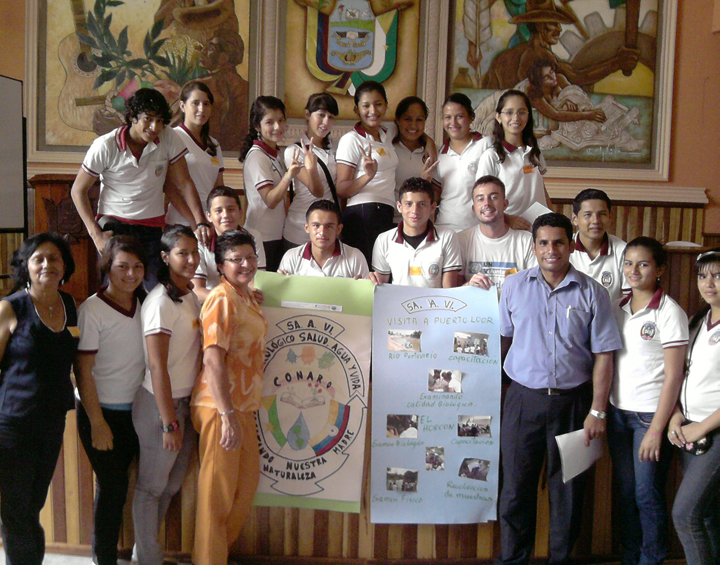

Ecuadorian students learn about Water and Life

The canton of Rocafuerte, near the coast of Ecuador, suffers a multitude of water-related problems: pollution of its rivers, the proliferation of mosquitoes carrying diseases like dengue, deforestation of the riverbanks and even flooding. Yet until very recently, no one paid much attention.
"Environmental pollution is a subject that we never took into account before,” says Génesis Olguín, president of the "Health, Water and Life" ecological club established last year at a local school.
The club was formed with the support of the MDG-Fund, as part of an effort to improve Ecuador’s access to sustainable water and sanitation by building infrastructure and providing training and education in the areas of health and the environment.
Olguín says the club – whose mission is to educate young people about the importance of preserving the environment – has already had an impact. "There have been changes in our school, and now no water is wasted. People don’t throw garbage in the yards but instead use bins that we build with recycled bottles.”
The club promotes partnerships between institutions and organizations involved in water management and preservation and works closely with the municipality of Rocafuerte and local organizations committed to preserving the environment in general and water in particular.
It has created a space to present its proposals and concerns and, with the support of their teachers, has led community initiatives such as monitoring water quality, the state of waterways and groundwater, or cleaning and reforestation of the banks.
"It's very satisfying because we know a lot about caring for the environment and these young people are being empowered," says Elvira Zambrano, a teacher at the National College of Rocafuerte, where the club is based.
Zambrano says one of the keys to the success of the club is that it is the students who are helping change the habits of the adults in their families.
For example, the club has set up a school garden nursery to grow small plants that the younger students can take home. It is also collaborating with the provincial government to launch a campaign for the collection and safe disposal of used batteries.
The club is part of a strategy entitled the "National Network of Ecological Clubs" spearheaded by the Association of Municipalities of Ecuador. The joint UN programme has worked with the municipalities to ensure that planning for development and land use include a focus on integrated management of water resources.
The joint programme, a collaboration between the government and five UN agencies, is one of four financed by the MDG-Fund to help Ecuador achieve the Millennium Development Goals, with a particular focus on bringing services to the poorest communities and empowering the most marginalized populations to take charge of managing their own resources.
For the "Health, Water and Life” club’s vice-president, Kelvin Solorzano, being part of the effort has been “very enriching”. Before, he says, he did not understand the impact of wasting water, littering, or other actions that he did without knowing the damage they caused to the environment.
What makes the club’s work so rewarding, he says, is: "Knowing many people and taking the message to rural communities and seeing people happy, motivated and willing to learn. First we ourselves get trained, and then we teach about water, recycling, pollution. I look forward to being part of the club even after I leave school. "
Click here to read other success stories from the MDG-F's work to fight poverty and improve livelihoods around the world.